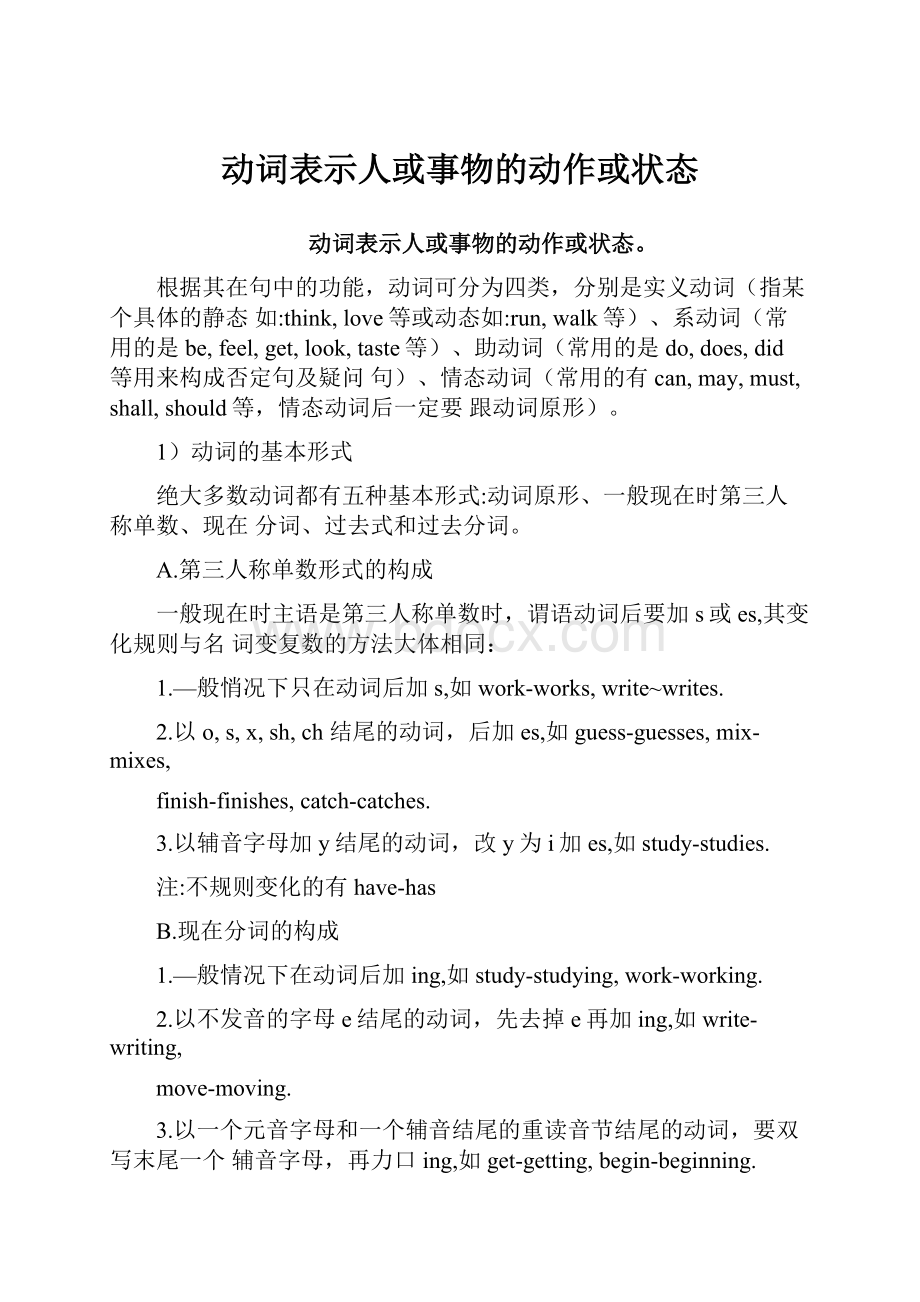动词表示人或事物的动作或状态.docx
《动词表示人或事物的动作或状态.docx》由会员分享,可在线阅读,更多相关《动词表示人或事物的动作或状态.docx(12页珍藏版)》请在冰豆网上搜索。

动词表示人或事物的动作或状态
动词表示人或事物的动作或状态。
根据其在句中的功能,动词可分为四类,分别是实义动词(指某个具体的静态如:
think,love等或动态如:
run,walk等)、系动词(常用的是be,feel,get,look,taste等)、助动词(常用的是do,does,did等用来构成否定句及疑问句)、情态动词(常用的有can,may,must,shall,should等,情态动词后一定要跟动词原形)。
1)动词的基本形式
绝大多数动词都有五种基本形式:
动词原形、一般现在时第三人称单数、现在分词、过去式和过去分词。
A.第三人称单数形式的构成
一般现在时主语是第三人称单数时,谓语动词后要加s或es,其变化规则与名词变复数的方法大体相同:
1.—般悄况下只在动词后加s,如work-works,write~writes.
2.以o,s,x,sh,ch结尾的动词,后加es,如guess-guesses,mix-mixes,
finish-finishes,catch-catches.
3.以辅音字母加y结尾的动词,改y为i加es,如study-studies.
注:
不规则变化的有have-has
B.现在分词的构成
1.—般情况下在动词后加ing,如study-studying,work-working.
2.以不发音的字母e结尾的动词,先去掉e再加ing,如write-writing,
move-moving.
3.以一个元音字母和一个辅音结尾的重读音节结尾的动词,要双写末尾一个辅音字母,再力口ing,如get-getting,begin-beginning.
4.以ie结尾的名词,一般将ie改为y,再加ing,如lie-lying,die-dying,tie-tying.
C.过去式和过去分词的构成
1.—般'惰况直接加ed,如ask-asked,work-worked.
2.以不发音的e结尾,只加d,如love-loved,dance-danced.
3.以辅音字母加y结尾,把y变为i加ed,如try-tried,study-studied.
4.以一个元音字母和一个辅音结尾的重读音节结尾的动词,先双写末尾一个字母,再加ed,如
stop-stopped.
练习:
I.用be动词的适当形式填空
1.yourfatheraworker?
Yes,he.
2.Theyintheclassroom.
3.Wheremybooks?
4.Theseherpears・
5.HowmuchtheT-shirt?
6.Howmuchthesocks?
7・0m?
motherfortylastyear・
8.Youcaninourschoolmusicclub・
9.Let'sfriends・
10.HeandIfriends・
11.Someoneintheroom・
12.Theresomeapplesonthetableyesterday.
II.划出每句中正确的词
1.(Is/Are)hiseraseronthesofa?
2.(Where/What)areyourbaseball?
3.(Do/Does)Maryhaveaclock?
4.(Are/Do)theywanttoseeamovie?
5.・(Is/Can)sheplaytheviolin?
6.I(don't/doesn't)likehamburgers・
7.WhydoesAlice(likes/like)music?
8.Who(am/is)yourfather?
9.(What/What's)herfavoritesubject?
10.Howmuch(are/is)hersocks?
11.I(am,is,was,were)busylastweek・
12.TomandI(am,are,was,were)lateforschoolyesterday.
13.I(walk,walks,walked,walking)toschoollastSaturday.
14.Rose(doesnot,didnot,)visitherunclelastmonth・
15・There(is,was,are,were)alotofpeopleovertheretenyears
ago.Ill.写出下列动词的第三人称单数、现在分词和过去式。
如:
look-looks-looking-looked
drink
go
stay
make
teach
ride
have
passcarrycomewatch.plant.flystudy.brush.readrunwrite.swimgetsaytake.seebegin.
dance
IV・用所给词的正确形式填空。
1.
Letme
(help)youfindyourpurse・
2.
Wouldyoulike
(buy)thingsforNewYear'sDay?
3.
Ilike
(make)kites・
4.
Hecan
(skate)betterthanME.
5.
Youmust
(listen)toyourteacherinclass・
6.
Theyenjoy
(play)basketbal1.
7.
Shewants
(watch)cartoons・
8.It'stimefor
知识要点
2).—般现在时
us(read)books・
一般现在时的用法:
1•表示事物或人物的特征、状态。
如:
Theskyisblue.天空是蓝色的。
2•表示经常性或习惯性的动作。
如:
Igetupatsixeveryday•我每天六点起床。
3•表示客观现实。
如:
Theearthgoesaroundthesun•地球绕着太阳转。
4.有时这个时态表示按计划、规定要发生的动作(句中都带有时间状语),但限于少数动词,如:
begin,come,leave,go,arrive,start,stop,return,open,close等。
如:
Themeetingbeginsatseven•会议7点开始。
5.在时间状语从句和条件状语从句中,用一般现在时表示将来。
如:
Ifyoucomethisafternoon,we'11haveameeting・如果你今天下午来,我们将开会。
一般现在时的结构:
1.be动词:
主语+be(am,is,are)+其它。
如:
Iamaboy.我是一个男孩。
2.行为动词:
主语+行为动词(+其它)。
如:
WestudyEnglish.我们学习英语。
当主语为第三人称单数(he,she,it)时,要在动词后加"-s"或"-es"。
如:
MarylikesChinese.玛丽喜欢汉语。
—般现在时常用的时间词:
often,usually,sometimes,everyday(week,year・・・)等。
练习:
I.用括号内动词的适当形式填空。
1.Heoften(have)dinnerathome・
2.DanielandTommy(be)inClassOne・
3.We(notwatch)TVonMonday.
4.Nick(notgo)tothezooonSunday.
5.they(like)theWorldCup?
6.Whattheyoften(do)onSaturdays?
7.yourparents(read)newspaperseveryday?
8.Thegirl(teach)usEnglishonSundays・
9.SheandI(take)awalktogethereveryevening・
10.There(be)somewaterinthebottle・
11.Mike(like)cooking・
12.They(have)thesamehobby.
13.Myaunt(look)afterherbabycarefully.
14.Youalways(do)yourhomeworkwel1.
15.I(be)ill.I'mstayinginbed・
16.She(go)toschoolfromMondaytoFriday.
17.LiuTao(do)notlikePE.
18.Thechildoften(watch)TVintheevening・
19.SuHaiandSuYang(have)eightlessonsthisterm.
20.-Whatday(be)ittoday?
-It,sSaturday
II.改错(划出错误的地方,将正确的写在横线上)
1.IsyourbrotherspeakEnglish?
2.Doeshelikesgoingfishing?
3.Helikesplaygamesafterclass.
4.Mr.WuteachsusEnglish.
5.Shedon,tdoherhomeworkonSundays.
知识要点
3).现在进行时
现在进行时的用法:
.现在进行时表示现在正在进行或发生的动作,也可表示当前一段时间内的活动或现阶段正在进行的动作。
现在进行时的结构:
be+动词ing.
现在进行时常见的标志词:
now,Look!
Listen!
现在进行时还可以表示将来•如:
HeisflyingtoBeijingtomorrow.他明天将乘飞机去北京。
练习:
I.用所给的动词的正确形式填空:
1.Theboy(draw)apicturenow.
2.Listen!
Somegirls(sing)intheclassroom・
3.Mymother(cook)somenicefoodnow.
4.Whatyou(do)now?
5.Look!
They(have)anEnglishlesson・
6.They(not,water)theflowersnow.
7.Look!
thegirls(dance)intheclassroom・
8.Whatisourgranddaughterdoing?
She(listen)tomusic.
9.It's5o'clocknow.We(have)suppernow
10.Helen(wash)clothes?
Yes,sheis・
11.1steno'clock・Mymother(lie)inbed・
12.Whathe(mend)?
13.We(play)gamesnow.
14.Whatyou(do)thesedays?
15.he(clean)theclassroom?
16.Who(sing)inthenextroom?
17.Thegirl(like)wearingasweater・Look!
She(wear)ared
sweatertoday.II.单项选择
()1.Look!
Hetheirmotherdothehousework・
A.ishelping
B.arehelp
C.ishelpD・ishelpping
()2・aretheboysdoing?
Theyaresingingintheroom.
A.Who
B.HowC.WhatD.Where
()3・Don'ttalkhere・Mymother・
A.issleepingB・aresleepingC・sleepingD・sleep
()4.Danny・Don'tcallhim.
A.iswriteingB.iswritingC・writingD・writes
()5・一Whenheback?
一Sorry,Idon'tknow・
A.does,come
B.are,coming
C.is,come
D.is,coming
()6・Thechildrenfootbal1.
A.isplaying
B.areplaying
C・playthe
D.playa
()7・Listen!
Sheintheclassroom.
A.issinging
B.singC・tosingD・issing
()8・It'ssixintheafternoon.TheGreenslunchtogether.
A.has
B.arehaving
C.havehad
D.hadhad
()9.SomeGermans(visit)ourschool.
A.isvisiting
B.arevisiting
C・visitDvisiting
()10.IwanttoknowwhenheforNewYorktomorrow・
A.hasleft
B.isleaving
C・hadleft
D.hasbeenleaving
A.isvisiting
B.arevisiting
C.visitDvisiting
()15.SomeGermans(visit)ourschool・
知识要点
4).一般将来时
一般将来时的用法:
表示将要发生的动作或存在的状态及打算、计划或准备做某事。
—般将来时的基本结构:
①begoingto+do;®will+do.
一般将来时常用的时间词:
tomorrow,nextweek(month,year…),soon,thedayaftertomorrow,in+一段时间等。
练习:
1.填空。
1•我打算明天和朋友去野炊。
Ihaveapicnicwithmyfriends・
Ihaveapicnicwithmyfriends・
2.下个星期一你打算去干嘛?
我将去打篮球。
WhatnextMonday?
I
playbasketball.
WhatyoudonextMonday?
Iplaybasketbal1.
3.你们打算什么时候见面。
Whattimeyoumeet?
II.用所给词的适当形式填空。
1.Todayisasunnyday.We(have)apicnicthis
afternoon.
2.Mybrother(go)toShanghainextweek・
3.Tomoften(go)toschoolonfoot.
Buttodayisrainy.He(go)toschoolbybike・
4.Whatdoyouusuallydoonweekends?
Iusually(watch)
TVand(catch)insects?
5.It'sFridaytoday.Whatshe(do)thisweekend?
She(watch)TVand(catch)insects・
6.Whatyou(do)nextSunday?
I(milk)
cows・
7.Mary(visit)hergrandparentstomorrow.
8.David(give)apuppetshownextMonday.
9.I(plan)formystudynow
知识要点
5).一般过去时
一般过去时的用法:
间发生的动作或存在的状态,常和表示过去的时间状语连用。
一般过去时也表示过去经常或反复发生的动作或状态。
1.过去某个时间所发生的动作或存在的状态。
e.g.Iboughtanewshirtyesterday.
Hewasaworkertwoyearsago.
2.过去一段时间内,经常性或习惯性的动作。
e.g.WhenIwasachild,Ioftenplayedwithfire・LiLeialwayswalkedtoschoollastterm・
3•谈到已故人的情况时多用过去时。
e.g.LuXunwasagreatwriter.
—般现在时常用的时间词:
yesterday或山其构成的短语,yesterdaymorning由"last"构成的短语lastyear
由"时间段+ago"构成的短语,e.g.threedaysago;另外在宾语从句中主句为过去时,一般从句也用过去时.
练习:
I.单项选择。
().1ShelivedtherebeforehetoChina・
A.came
B.comes
C.come
D.coming
()・2Ibutnothing・
A・waslistened;washearingB.listened;heard
C・havelistened;heardD.listened;heardof
().3Whendidyouhere?
A.gotto
B.reached
C.arrivein
D・reach
().4Imyhomeworkat7:
00yesterdayevening・
A.did
B.woulddo
C・wasdoing
D.do
().5-Hewentshoppingwithyouyesterdayafternoon,didn'the?
-
A.No,hedoesn,t
B.Yes,hedidn't
C.No,hedid
D.Yes,hedid・
II.用所给词的正确形式填空。
1They(be)onthefarmamomentago.
2Jenny(notgo)tobeduntil11:
00o'clocklastnight・
3.I(see)LiLei(go)outjustnow.
4He(do)hishomeworkeveryday・Buthe_(notdo)ityesterday.
5When
6When
7Did:
8I
wasyoung,I(play)gamesyou(write)thisbook?
I(have)lunchathome?
(eat)thebreadbeforeIwent
withmyfriends・
itlastyear.
toschool.